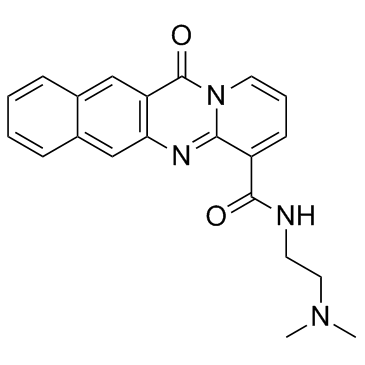
BMH-21
CAS No. 896705-16-1
BMH-21( BMH21 )
Catalog No. M16450 CAS No. 896705-16-1
BMH-21 is a RNA polymerase I inhibitor with wide and potent antitumorigenic activity across NCI60 cancer cell lines with mean GI50 of 160 nM.
Purity : >98% (HPLC)
 COA
COA
 Datasheet
Datasheet
 HNMR
HNMR
 HPLC
HPLC
 MSDS
MSDS
 Handing Instructions
Handing Instructions
| Size | Price / USD | Stock | Quantity |
| 5MG | 32 | In Stock |


|
| 10MG | 50 | In Stock |


|
| 25MG | 88 | In Stock |


|
| 50MG | 149 | In Stock |


|
| 100MG | 259 | In Stock |


|
| 200MG | 389 | In Stock |


|
| 500MG | Get Quote | In Stock |


|
| 1G | Get Quote | In Stock |


|
Biological Information
-
Product NameBMH-21
-
NoteResearch use only, not for human use.
-
Brief DescriptionBMH-21 is a RNA polymerase I inhibitor with wide and potent antitumorigenic activity across NCI60 cancer cell lines with mean GI50 of 160 nM.
-
DescriptionBMH-21 is a RNA polymerase I inhibitor with wide and potent antitumorigenic activity across NCI60 cancer cell lines with mean GI50 of 160 nM, interacts with GC-Rich rDNA, potently and rapidly represses RNA polymerase I (Pol I) transcription; inhibits the expression of 47S rRNA transcript with IC50 of 60 nM, blocks transcription of the rRNA precursor without affecting rRNA maturation, and causes segregation of nucleolar proteins; causes proteasome-mediated degradation of RPA194 (Pol I catalytic subunit); activates p53 and inhibits TP53 null and mutant cell lines with GI50 of 110 and 205 nM, respectively.
-
In VitroBMH-21 binds ribosomal DNA and inhibits Pol I transcription.BMH-21 inhibits RNA polymerase I independent of DNA damage response.BMH-21 intercalates into double strand (ds) DNA and has binding preference towards GC-rich DNA sequences.BMH-21 (1 μM; 3 hours) acts in a DNA damage independent manner to activate nucleolar stress and RPA194 degradation.Cell Viability AssayCell Line:U2OS cells Concentration:0 μM, 0.1 μM , 1 μM, 10 μM Incubation Time:48 hoursResult:Decreased the viability of cells at concentrations that activated the DNA damage response.Western Blot AnalysisCell Line:A375 cellsConcentration:1 μM Incubation Time:3 hours Result:Degraded RPA194 with blocked ATM and DNA-PKcs activity.
-
In VivoBMH-21 (50 mg/kg; i.p.; daily; for 6 days) inhibits HCT116 colon cancer tumor growth in vivo. Animal Model:6-week old athymic NCr nu/nu mice, with HCT116 colorectal carcinoma xenograft Dosage:50 mg/kg Administration:Intraperitoneal injection, daily, for 6 days Result:Significantly inhibited HCT116 colon cancer tumor growth.
-
SynonymsBMH21
-
PathwayCell Cycle/DNA Damage
-
TargetDNA/RNA Synthesis
-
RecptorRNApolymeraseI
-
Research AreaCancer
-
Indication——
Chemical Information
-
CAS Number896705-16-1
-
Formula Weight360.4091
-
Molecular FormulaC21H20N4O2
-
Purity>98% (HPLC)
-
Solubility10 mM in DMSO
-
SMILESO=C(C1=CC=CN2C1=NC3C=C(C=CC=C4)C4=CC3C2=O)NCCN(C)C
-
Chemical Name12H-Benzo[g]pyrido[2,1-b]quinazoline-4-carboxamide, N-[2-(dimethylamino)ethyl]-12-oxo-
Shipping & Storage Information
-
Storage(-20℃)
-
ShippingWith Ice Pack
-
Stability≥ 2 years
Reference
1. Peltonen K, et al. Cancer Cell. 2014 Jan 13;25(1):77-90.
2. Colis L, et al. J Med Chem. 2014 Jun 12;57(11):4950-61.
3. Colis L, et al. Oncotarget. 2014 Jun 30;5(12):4361-9.
4. Peltonen K, et al. Mol Cancer Ther. 2014 Nov;13(11):2537-46.
molnova catalog



related products
-
TFMB-(S)-2-HG
TFMB-(S)-2-HG (TFMB S 2 HG) is a highly effective inhibitor of TET2, the 5'-methylcytosine hydroxylase. Additionally, it significantly inhibits the EglN prolyl hydroxylases.
-
Mefenidil
Mefenidil (McN-2378), a selective cerebral vasodilator, was shown to increase CBF in healthy brains without stimulating O2 uptake in a dog anesthesia model.
-
Thymectacin
Thymectacin (NB 1011) is a selective thymidine synthase (TS) inhibitor with anticancer activity for the study of colon cancer and solid tumors.



 Cart
Cart
 sales@molnova.com
sales@molnova.com


